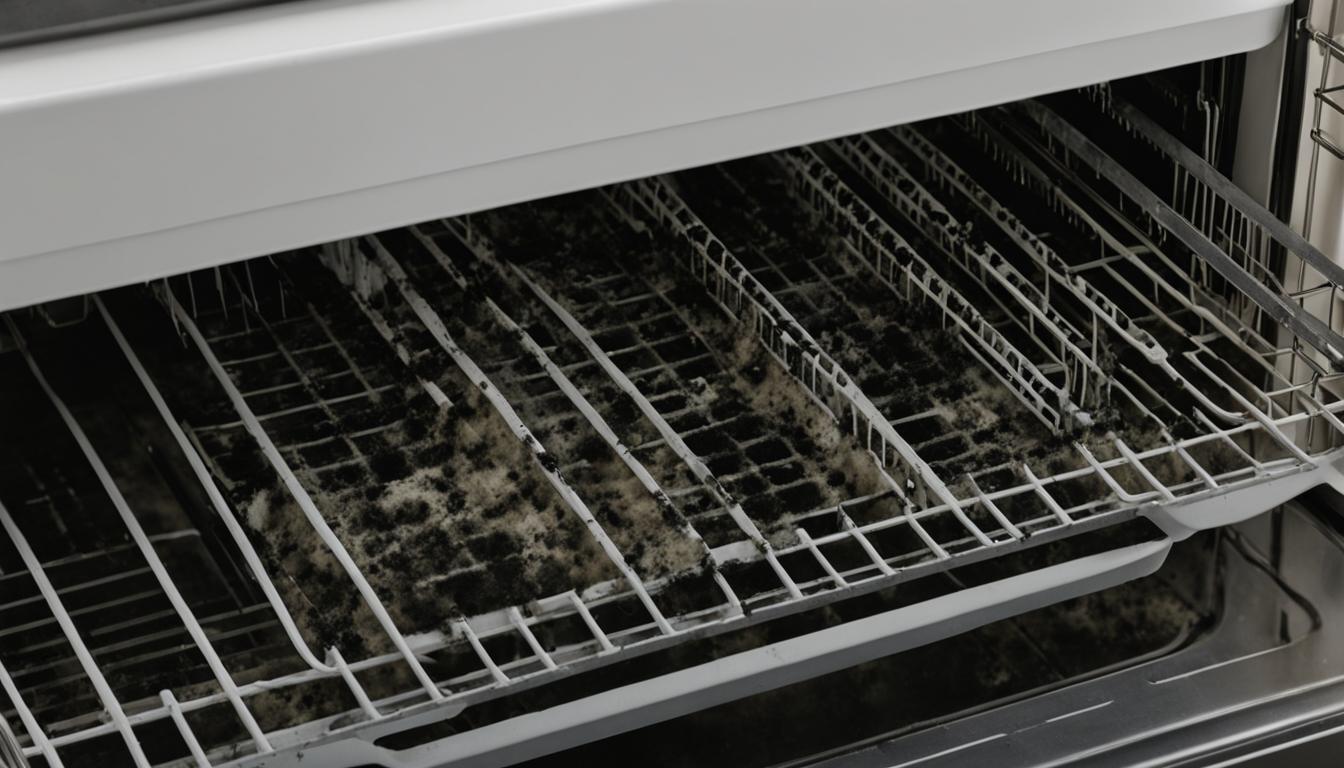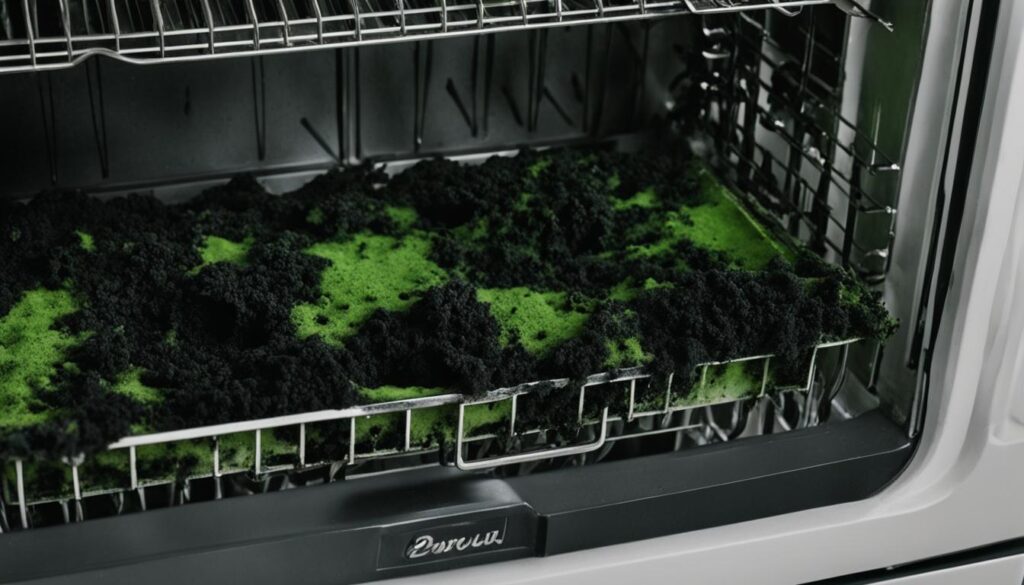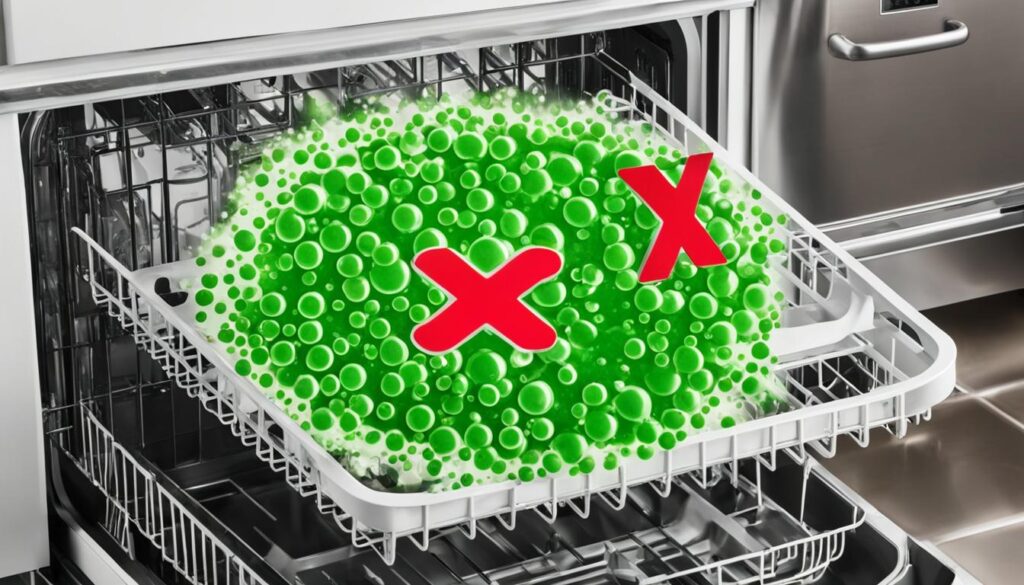
Eliminating Black Mold in Dishwasher Safely
Black mold in your dishwasher can be a dangerous problem. If left untreated, it can not only damage your dishwasher but also have negative health effects. In this section, we will discuss safe and effective methods for removing black mold in your dishwasher in a way that protects both you and your appliance. We will also provide tips on how to prevent mold from returning in the future.
Key Takeaways:
- Black mold in dishwashers can cause health issues if not eliminated.
- Safe and effective methods for removing mold in dishwashers are available.
- Prevention is crucial for keeping your dishwasher mold-free.
Understanding Black Mold in Dishwashers
Black mold in dishwashers is a common problem that can wreak havoc on your health. It is a type of fungus that thrives in damp and dark places. When left unaddressed, black mold in dishwashers can release harmful spores that can cause respiratory problems, headaches, and other adverse health effects.
One of the main causes of black mold in dishwashers is the accumulation of food debris and moisture. This creates a perfect breeding ground for mold spores to grow and spread. Symptoms of black mold in dishwashers include:
- Musty or earthy odor
- Black, green, or grey stains on the dishwasher walls, racks, and utensil holders
- Allergic reactions, such as sneezing, runny nose, and itchy eyes
- Breathing difficulties, coughing, and wheezing
If you notice these symptoms, it’s essential to address the issue immediately to prevent it from getting worse. The infographic below offers a visual representation of the signs of black mold in your dishwasher.
Comparing Black Mold to Other Types of Mold in Dishwashers
| Type of Mold | Appearance | Symptoms |
|---|---|---|
| Black Mold | Black, green, or grey stains | Musty odor, allergic reactions, breathing difficulties |
| Green Mold | Greenish stains | Allergic reactions, breathing difficulties |
| Yellow Mold | Yellowish stains | Allergic reactions, breathing difficulties |
| White Mold | White or greyish stains | Allergic reactions, breathing difficulties |
It’s crucial to identify the type of mold in your dishwasher to determine the best course of action. Black mold is the most dangerous and requires immediate attention.
Taking Immediate Action Against Black Mold
Black mold in your dishwasher can be hazardous to your health and cause unpleasant odors within your kitchen. Acting promptly and safely is paramount when dealing with this issue. Follow these step-by-step instructions to remove black mold from your dishwasher.
- Wear gloves and a face mask to protect yourself from the mold spores.
- Remove the dishwasher racks and set them aside. Inspect them for any signs of mold growth. If any mold is present, clean the racks thoroughly with a mix of hot water and dish soap.
- Check the dishwasher interior for any visible mold growth, particularly near the door gasket and hidden crevices.
- Prepare a cleaning solution of one cup of white vinegar mixed with one cup of hot water. Apply the solution onto the affected areas and let it sit for 30 minutes.
- After 30 minutes, scrub the areas with a soft-bristle brush until the mold is removed. Use a cloth or paper towel to wipe away the cleaning solution and any dirt or debris.
- Run the dishwasher through a cycle with just hot water to rinse and remove any remaining vinegar residue.
By following these steps, you can effectively remove black mold from your dishwasher. However, it’s equally important to take preventive measures to keep the mold from returning. Consider the following tips to prevent further black mold growth in your dishwasher.
- Empty the dishwasher immediately after running a cycle to prevent moisture buildup.
- Wipe down the interior with a dry cloth to remove any excess moisture.
- Leave the dishwasher door open between cycles to allow for air circulation and drying.
- Regularly clean the dishwasher with a mixture of hot water and white vinegar to prevent mold from recurring.
Remember, prompt action and consistent prevention are key to keeping your dishwasher free of black mold and ensuring a clean and healthy kitchen.
Natural Remedies for Removing Black Mold in Dishwashers
If you prefer natural solutions to eliminate black mold from your dishwasher, you can take advantage of several household ingredients that possess potent antifungal properties.
Vinegar is an effective solution to get rid of black mold in your dishwasher, given its acidic properties. You can add one cup of white vinegar to the dishwasher’s bottom and run a hot cycle to remove the mold.
Baking soda is another natural solution that works wonders against black mold in your dishwasher. Mix a quarter cup of baking soda with water to create a paste, and apply it to the affected areas. Let it sit for several hours before rinsing it off with warm water.
You can also use tea tree oil to eliminate black mold from your dishwasher. Add a few drops of tea tree oil to a spray bottle filled with water and spray the affected areas. Let it sit for a few minutes, then wipe the surface with a clean cloth.
Remember to wear protective gloves and a mask when using natural remedies to remove black mold from your dishwasher.
Expert Tip: To maintain a mold-free dishwasher, it’s essential to keep the appliance dry after each use. Wipe it down with a clean towel or cloth, and leave it open for air circulation.
Using Commercial Mold Removal Products
If you’re dealing with a severe case of black mold in your dishwasher, commercial mold removal products can be a powerful solution. There are several types of products available, each with its advantages and drawbacks.
Bleach: A frequent go-to for many, bleach can be effective at killing black mold in dishwashers. However, it can cause damage to the dishwasher’s components if not used appropriately. It can also be harmful if inhaled or mixed with other cleaning products.
Vinegar: White vinegar is a natural disinfectant that can eliminate black mold in dishwashers. Mix equal parts of white vinegar and water in a spray bottle, then spray the solution on the affected areas. Let it sit for 30 minutes, then wipe clean.
Mold Control Sprays: Mold control sprays are widely available in stores and online. Always follow the instructions when using to ensure that it’s safe to use on dishwashers. One such product is the Corsair Mold Control Spray that can be used to eliminate black mold in dishwashers and prevent it from returning. Spraying it on the affected area, letting it sit for 10-15 mins, then wiping with a damp cloth might be sufficient.
Before using any commercial product, ensure that it’s safe for your specific dishwasher’s model and is approved for use in dishwashers. Always follow the instructions when using to ensure safe and effective black mold removal.

Professional Mold Remediation Services for Dishwashers
If you have a severe black mold problem in your dishwasher, it may be time to call in the experts. Professional mold remediation services can provide an effective solution for combating the issue and ensuring a safe and healthy appliance.
It’s important to note that not all mold remediation companies are created equal. Do your research and choose a reputable company with experience in dishwasher mold removal. Look for certifications and customer reviews to ensure you’re making the right choice.
When you hire a professional, they will typically start with an inspection of your dishwasher to assess the severity of the mold problem. They may use advanced techniques such as infrared imaging to detect mold growth behind the dishwasher’s walls.
Beyond removing the visible mold, a professional service will also address the root cause of the problem, such as leaks or excess moisture. They may recommend repairs or modifications to prevent mold growth from recurring in the future.
Mold remediation can be a costly service, but it’s worth the investment to ensure the safety of your household. Keep in mind that an untreated mold problem can lead to serious health issues such as respiratory problems and allergies.
Preventing Black Mold Growth in Dishwashers
Once you’ve removed black mold from your dishwasher, it’s crucial to take steps to prevent it from returning. By following the tips below, you can keep your appliance clean, odor-free, and mold-free.
Run Your Dishwasher Regularly
One of the most effective ways to prevent black mold growth is to run your dishwasher regularly. This helps to reduce moisture and prevent mold from developing in the first place. Make sure to use your dishwasher at least once a week, even if it’s not completely full.
Clean Your Dishwasher Regularly
Regular cleaning is essential for maintaining a mold-free dishwasher. Wipe down the interior of your dishwasher with a solution of vinegar and water at least once a month. This helps to kill any mold spores that may be present.
Avoid Overloading Your Dishwasher
Overloading your dishwasher can cause dishes to block the flow of water and create a breeding ground for mold. Make sure to leave enough space between dishes for water to flow freely.
Avoid Using Too Much Detergent
Using too much detergent can create excessive suds and cause water to pool, leading to mold growth. Follow the manufacturer’s instructions for the proper amount of detergent to use.
Leave Your Dishwasher Open After Use
After every use, leave your dishwasher open for a few hours to allow it to air out. This helps to reduce moisture and prevent mold growth.
Regular Maintenance for Mold-Free Dishwashers
Preventing black mold in your dishwasher is essential to keep it clean and healthy. Regular maintenance is vital in reducing the risk of mold growth. Here are some simple practices that you can incorporate into your daily routine:
- Always remove leftover food particles from dishes before placing them in the dishwasher
- Clean the dishwasher’s interior and exterior with a damp cloth and an all-purpose cleaner.
- Inspect the drain and disposal system regularly to ensure they are free of blockages and debris
- Run hot water and vinegar through your dishwasher to eliminate any excess food debris and buildup.
- Regularly check the rubber gasket around the dishwasher door for mold growth or damage and replace it if necessary
- Replace dishwasher filters regularly to maintain optimal performance
By implementing these simple steps, you can maintain a mold-free dishwasher and ensure it operates effectively and efficiently. Regular maintenance is crucial in preventing black mold in dishwasher and keeping it hygienic.

Conclusion
In conclusion, black mold in your dishwasher is a common issue that can be effectively addressed. By following the steps outlined in this article, you can safely eliminate the black mold and prevent its return, ensuring a clean and hygienic dishwasher for years to come. It’s important to take immediate action at the first sign of mold growth and implement preventative measures to avoid recurring infestations. Regular maintenance and cleaning will also go a long way in keeping your dishwasher mold-free. Remember, if the mold problem persists, it’s advisable to seek professional assistance such as Fix Mold Miami, Florida’s highest-rated in mold assessments, prevention, and remediation. Contact FixMold at 305-465-6653 for safe and effective mold removal services.
FAQ
How can I safely eliminate black mold from my dishwasher?
To safely eliminate black mold from your dishwasher, start by removing any visible mold using a mixture of bleach and water, wearing protective gloves and a mask. Then, run a hot water cycle with vinegar or hydrogen peroxide to kill any remaining mold spores. Finally, thoroughly clean the dishwasher with a mold-fighting cleaner and ensure it is completely dry before using it again.
What are the signs and symptoms of black mold growth in my dishwasher?
Signs of black mold growth in your dishwasher can include a musty odor, visible black or greenish patches on the walls or racks, and health symptoms such as coughing, sneezing, or allergic reactions when using the dishwasher. If you notice these signs, it’s important to take immediate action to eliminate the mold and prevent its recurrence.
How can I prevent black mold from growing in my dishwasher?
To prevent black mold from growing in your dishwasher, make sure to run regular maintenance cycles with bleach or vinegar, clean the dishwasher filters regularly, and leave the dishwasher door slightly open after each use to allow for proper ventilation. Additionally, avoid leaving dirty dishes in the dishwasher for extended periods and keep the dishwasher area dry to discourage mold growth.
Are there natural remedies I can use to remove black mold from my dishwasher?
Yes, there are natural remedies you can use to remove black mold from your dishwasher. These include using a mixture of baking soda and vinegar, or a paste made from hydrogen peroxide and baking soda. These natural solutions can effectively eliminate mold without the use of harsh chemicals.
Should I hire a professional mold remediation service for my dishwasher?
If the black mold problem in your dishwasher is severe and persists despite your efforts, it may be necessary to hire a professional mold remediation service. These professionals have the expertise and tools to safely remove the mold and prevent its recurrence, ensuring the health and safety of your appliance and the occupants of your home.
How often should I perform maintenance on my dishwasher to prevent mold growth?
To prevent mold growth, it’s recommended to perform maintenance on your dishwasher at least once a month. This includes removing and cleaning the filters, wiping down the interior with a mixture of vinegar and water, and running a cleaning cycle with vinegar or bleach. Regular maintenance will help keep your dishwasher mold-free and functioning properly.
Can black mold in my dishwasher be harmful to my health?
Yes, black mold in your dishwasher can be harmful to your health. Exposure to black mold spores can cause respiratory issues, allergies, headaches, and other health problems, particularly for individuals with pre-existing respiratory conditions or weakened immune systems. It’s essential to address the mold issue promptly and take necessary precautions to ensure a safe and healthy environment.




